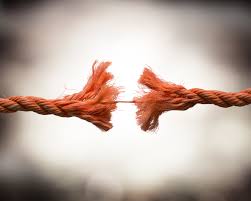Ready to Snap
Great challenges make us cry out for answers. Every person will confront deep physical pain or emotional trauma. When the ache becomes agony, when we feel about to snap, we might call out to the heavens with our unhappiness. Sometimes we get an answer.
In Torah, Rebekah conceived the twins Esau and Jacob. The twins struggled in her womb. Rebekah cries out, at Gen. 25:23, “if so, then why do I exist?” She inquired of God. And God answered with an explanation about the nature of the two children within her. “Two nations are in your womb, Two separate peoples shall issue from your body; One people shall be mightier than the other, And the older shall serve the younger.”
While God’s answer is correct, he did not answer Rebekah’s question. She questioned her own existence. How would you reply if someone you love is in agony, be it mental or physical or both? I am reminded of beautiful advice from Rabbi Mike Moskowitz about answering questions: “answer the person, not just the question.”
Too often in life, we respond with explanations. I don’t believe Rebekah was anticipating God’s answer describing the tortured future of her offspring. She likely just needed some encouragement to get through the day.
Dare I suggest that God could have tried a more compassionate response? “Rebekah, your pain is real. I hear your distress.” The first step is to acknowledge what you have heard and reflect that back.
“Rebekah, you can call upon me at any time and cry or scream as you need. You don’t need to hide how you feel when you are with me.” The second step is to create a safe space.
“Rebekah, you are strong and you are brave. I know that you wish you didn’t have to be strong and brave. And I know that you have the fortitude to persevere until this is over.” The third step is to acknowledge something positive.
“Rebekah, no one knows how much longer this will last for you. What coping mechanisms help you from day to day?” The fourth step is to acknowledge the challenges. For example, we may feel that we have lost control over our lives when we are in extreme pain. Finding the inner resolve to employ whatever methods are available to persevere is another challenge.
“Rebekah, pain can leave you wounded or even broken. Or pain can be a great teacher, so you learn how brave and strong you are, and how powerful you are to meet future challenges. I hope that this challenge will be for an education and not for lasting harm.” The final step is to provide a framework for moving forward, pointing to the possibility of a self-motivated reclaiming of one’s inner strength.
When the pain of living seems insurmountable, the answers we seek may be hard to discern. But the answer we need might be the presence, support, and encouragement of the people we love.
Rabbi Evan J. Krame





 Evan J. Krame was ordained as a rabbi by the
Evan J. Krame was ordained as a rabbi by the